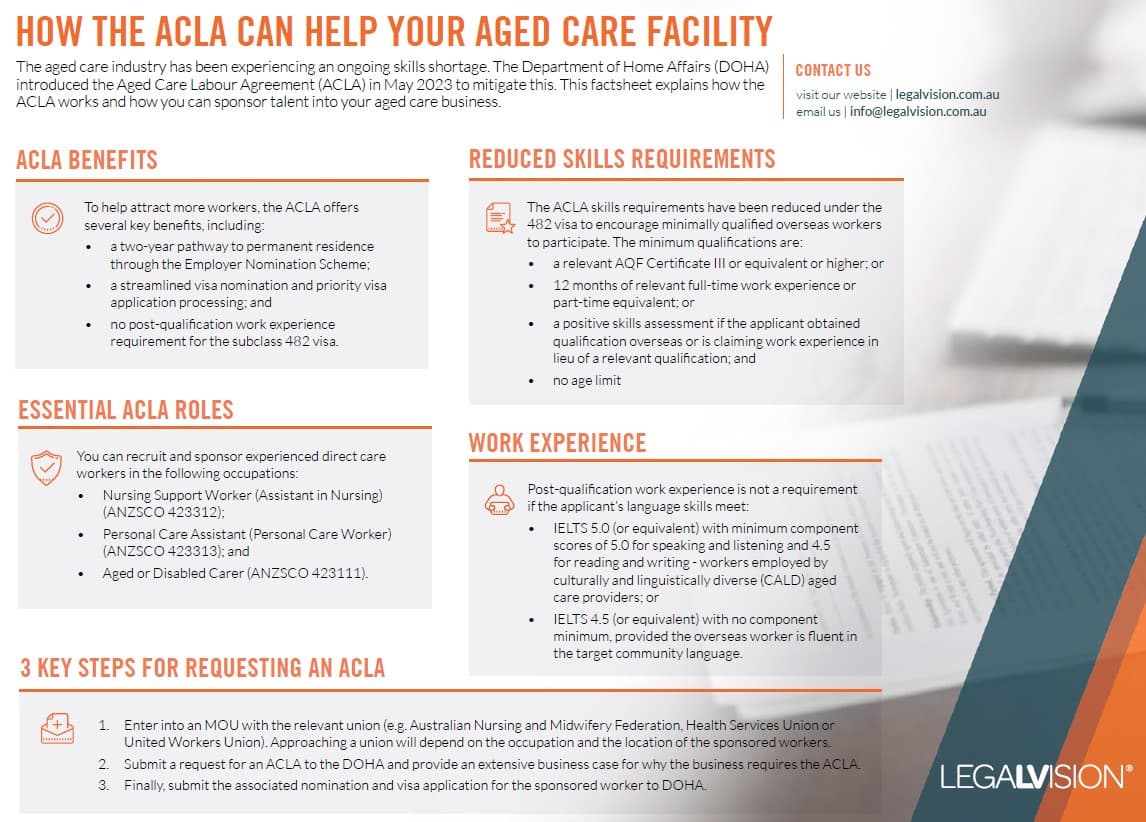If you have decided to start providing aged care services, it is essential to be aware of your obligations as a provider. This depends on the type of services you offer (residential, home care or flexible care services). This article explores the reporting obligations of an aged care service provider and why these are significant.

This factsheet explains how the ACLA works and how you can sponsor talent into your aged care business.
The Aged Care Act
The Aged Care Act 1997 (Act) regulates aged care in Australia, including:
- funding;
- regulation;
- approval of providers; and
- quality of care and the rights of people receiving care.
The Serious Incident Response Scheme (SIRS) was introduced in 2021, replacing the current mandatory reporting requirements. On 1 December 2022, SIRS was extended to home services. As an aged care provider, you must also meet other obligations, including the Aged Care Quality Standards and the Code of Conduct.
What is the Serious Incident Response Scheme?
SIRS enables providers to effectively respond to serious incidents and take steps to ensure they do not reoccur. SIRs require providers to effectively manage and take reasonable steps to prevent severe incidents through two key components:
- incident management responsibilities, including effective governance systems for the management and prevention of incidents and reporting of incidents of abuse and neglect; and
- reportable incident obligations, including reporting incidents of abuse and neglect.
This also includes implementing internal processes that your subcontractors and employees can follow, such as having clear chains of command so that the reporting process is clear. You can access more information and resources via the Aged Care Quality and Safety Commission website.
Continue reading this article below the formTypes of Reportable Incidents
There are eight types of reportable incidents involving aged care consumers that you must report to the Aged Care Commission. These types include:
- unreasonable use of force – kicking, punching or rough handling.
- unlawful sexual contact or inappropriate sexual conduct – stalking, making sexual advances or unwanted sexual touching.
- psychological or emotional abuse – yelling, name calling or ignoring.
- stealing or financial coercion by a staff member – stealing money or pressuring you to give money.
- neglect – not giving you the care you need to stay well.
- inappropriate use of restrictive practices – using physical force or medication to restrict your freedom or movement.
- unexplained absence from care / missing consumers – where a care recipient goes missing.
- unexpected death – someone dying unexpectedly because they did not receive proper care and services.
You may need to report some incidents to the police if it is criminal.
What Are the Reporting Timeframes?
The timeframes for reporting depend on the type of incident you need to report, the extent of injury or discomfort caused to the consumer, and whether you should report the incident to the police.
| Type | Description | Timeframe |
| Priority 1 | A Priority 1 reportable incident is a reportable incident: that caused, or could reasonably have been expected to have caused, a consumer physical or psychological injury or discomfort that requires medical or psychological treatment to resolve; where there are reasonable grounds to report the incident to the police; involving unlawful sexual contact or inappropriate sexual conduct inflicted on a consumer that is an unexpected death of a consumer; or where a consumer goes missing in the course of the provision of home services. | The Commission must be notified within 24 hours of becoming aware of the reportable incident. |
| Priority 2 | A Priority 2 reportable incident includes any reportable incident that does not meet the Priority 1 criteria as outlined above. | The Commission must be notified within 30 calendar days of becoming aware of the reportable incident. |
Practical Tips
If you plan to provide aged care services as a provider, it is essential to plan how you will handle such reporting incidents. Implementing an effective incident management system is crucial. You could also use the decision support tool and other resources, including effective serious incident investigation guidance by the Commission, to help step you through.
Overlap With Obligations Under the National Disability Insurance Scheme
If you provide services to clients receiving NDIS funding, be aware of separate mandatory reporting obligations you might have regarding NDIS participants. These obligations must be reported to the NDIS Quality and Safeguards Commission.
Key Takeaways
Mandatory reporting obligations in aged care are crucial to ensuring the safety and well-being of the elderly and vulnerable. If you provide services as an aged care service provider, understand your obligations and ensure you can comply with them.
If you require advice on aged care services and how to meet the mandatory reporting obligations, our experienced aged care and home care lawyers can assist as part of our LegalVision membership. For a low monthly fee, you will have unlimited access to lawyers to answer your questions and draft and review your documents. Call us today on 1300 544 755 or visit our membership page.
We appreciate your feedback – your submission has been successfully received.











